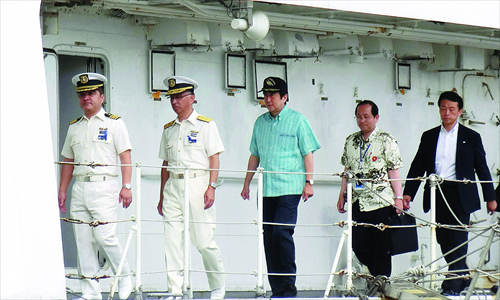Abe pays visit near Diaoyu

Japanese Prime Minister Shinzo Abe Wednesday (center) inspects a patrol boat of the Japan Coast Guard in the remote Okinawan island of Ishigaki, which is close to the disputed Diaoyu Islands in the East China Sea. Photo: AFP
Japanese Prime Minister Shinzo Abe visited two isles near the disputed Diaoyu Islands in the East China Sea on Wednesday, prompting China to urge Japan to "face up to history and reality and cease provocative remarks and actions."
As part of the election campaign for his Liberal Democratic Party (LDP), Abe on Wednesday traveled to Okinawa Prefecture and visited Ishigaki Island.
The island of Ishigaki lies about 170 kilometers away from the Diaoyu Islands, the dispute over which has plunged Japan-China ties to a nadir in recent months. Japan claims the Diaoyu Islands are under the jurisdiction of the city of Ishigaki.
According to the Asahi Shimbun, Abe traveled to Ishigaki Island to encourage coast guards who patrol the waters around the Diaoyu Islands. The visit made him the first sitting prime minister to visit the island in 48 years.
"With frequent approaches and the wandering of Chinese government vessels in surrounding waters, the security situation has become increasingly severe. I am determined to take the lead in protecting our territories," Abe was quoted by the paper as saying to some 40 coast guards.
Abe claimed that the Diaoyu Islands are "undoubtedly an integral part of Japan, historically and under international law," during a campaign speech in the city of Ishigaki later in the day, AFP reported.
"We won't budge one bit," he added.
In response to the visit, Chinese foreign ministry spokeswoman Hua Chunying said in a statement that the Chinese government will take "necessary measures" to resolutely safeguard its territorial sovereignty over the islets, and urged Tokyo to stop "provocative words and deeds."
On Wednesday afternoon, Abe also visited Miyako Island, which lies about 160 kilometers from the Diaoyu Islands and is the location of a Japan Air Self-Defense Force sub base.
By visiting the two islands and making the "provocative" remarks, Abe was not only aiming to win support for his party and boost the morale of coast guards, but also to demonstrate to China his tough stance over the Diaoyu Islands, Liu Jiangyong, a deputy director of the Institute of International Studies at Tsinghua University, told the Global Times.
Liu also said that the moves further showed that Tokyo is unlikely to change the tough stance over the Diaoyu Islands after the upper house elections due on Sunday.
"If the LDP and other parties that support the revision of the pacifist constitution, such as the Japan Restoration Party, win a landslide victory in the election, namely two thirds of the seats, they will spare no effort to create conditions for the revision of the constitution soon after the election," he said, adding that the Diaoyu Islands dispute just provided them with an excuse for the revision.
"It's very likely that they will continue playing up the so-called threat from China and continue their tough stance over the Diaoyu Islands," he added. "The tension between China and Japan will worsen to a more dangerous level in that case."
On the other hand, if they cannot win a landslide victory, Liu said Abe is likely to slow down his constitution revision initiative and adopt a more moderate stance when dealing with China.
A recent phone survey conducted by the Kyodo News showed that the LDP and its coalition partner, the New Komeito Party, are likely to seize more than 70 seats in the upper house elections, which would secure a definite majority for them.
"The series of provocative remarks and actions of Abe further prove that his earlier proposal to hold talks with China over the Diaoyu Islands was insincere and empty," Huang Dahui, director of the Center for East Asia Studies at the Renmin University of China, told the Global Times.
Although Huang said that Abe would stick to his tough stance over the dispute for a long time even after the election, Huang also noted that Japan would also seek opportunities to repair its relations with China for the sake of reviving its struggling economy.
"Although Japanese people have warmed to Abe's fiscal and monetary stimulus measures, the effect is unlikely to prevail in the long run," he said. "If Abe wants to reinforce the ruling status of his party, he has to repair relations with China."